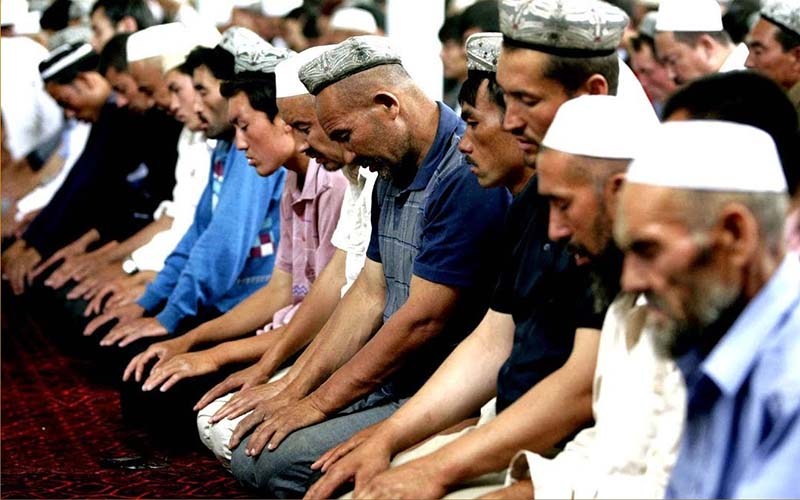Mike Pompeo condemns China’s treatment of Uyghurs
September 23, 2018 | Expert Insights

The United States denounced China's treatment of its Uighur Muslims in unusually strong terms, adding to a growing list of disputes in increasingly turbulent relations between the two powers.
Background
The Uyghurs are a Turkic ethnic group who live for the most part in northwestern China, a majority in the Uyghur autonomous region of Xinjiang and a lesser number live in the Central Asian republics. There are about 10 million Uyghurs in China and about 300,000 living in Uzbekistan, Kazakhstan and Kyrgyzstan.
Uighurs first rose to prominence in the 8th century, when they established a kingdom along the Orhon River in what is now north-central Mongolia. In 840 this state was overrun by the Kyrgyz, however, and the Uighurs migrated southwestward to the area around the Tien Shan. The Uighurs then formed another independent kingdom in the Turfan Depression region but were later overthrown by the expanding Mongols in the 13th century. The Uighurs of Xinjiang are predominantly Sunni Muslims.
Analysis
The US State Department has said it is deeply concerned over China’s “worsening crackdown” on minority Muslims in China’s northwestern territory of Xinjiang as the Trump administration reportedly considers sanctions against senior Chinese officials and companies linked to allegations of human rights abuses.
Secretary of State Mike Pompeo voiced alarm after a United Nations report described the mass internment of Uyghurs under the pretext of preventing extremism in the western Xinjiang region where the minority group is concentrated.
According to the report, Muslim ethnic minorities are being subjected to arbitrary detention, torture, egregious restrictions on religious practice and culture, and a digitized surveillance system so pervasive that every aspect of daily life is monitored. Many Uyghurs are held against their will in re-education camps where they are forced to endure severe political indoctrination and abuses.
The government of China has not officially confirmed that the camps exist. They are not governed by any judicial process & the detentions are on the order of police or party officials. The Chinese government have argued that harsh measures are needed to prevent violence associated with Uyghur separatism. The UN panel estimated that China has detained as many as 1 million Uyghurs in the internment camps and re-education programmes.
At the end of August, a group of US lawmakers asked US secretary of state Mike Pompeo and treasury secretary Steven Mnuchin to place sanctions on seven Chinese officials, including Chen Quanguo, Communist party chief in Xinjiang, who has overseen the crackdown. A US official told Reuters the idea of sanctions was still in the discussion stage.
The sanctions could be imposed under the Global Magnitsky Act which allows the US government to freeze the US assets of human rights violators, bar them from travelling to the US, and prohibit Americans from doing business with them.
The Washington-based Uyghur Human Rights Project tweeted a photo of activist Dolkun Isa, president of World Uyghur Congress, at the White House on Monday along with the comment: “A meeting with White House officials today provided much-needed encouragement for Uyghur human-rights advocates.”
Pompeo also expressed concern about the fate of Christians in China, who he said had been targeted in a government crackdown. The government, he said, has been “closing churches, burning Bibles and ordering followers to sign papers renouncing their faith.”
The focus on human rights comes as trade disputes mount between the world’s two largest economies and after the US sanctions against China’s purchase of Russian military jets and weapons.
Pakistan, China’s closest ally in the Muslim world, has also criticized its treatment of the Uyghur population.
Counterpoint
China has rejected the findings of the U.N. Committee on the Elimination of Racial Discrimination. Chinese foreign ministry spokeswoman Hua Chunying said that the report was “based on so-called information that is yet to be verified and has no factual basis.” Hua added that China was doing what was needed to combat extremism and terrorism on its western frontier.
Assessment
Our assessment is that Chinese authorities are using high-tech mass surveillance such as big data analysis, artificial intelligence, and the collection of DNA and voice biometrics to “identify, profile, and track everyone in Xinjiang.” We believe that some families have QR codes placed on their homes so that police can quickly access their personal information.








Comments